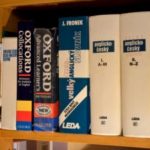Odpovědi z minulého týdne – poslech
Why does Lynda thank the man? He handed her her crutches.
Where is Monty? Two young men took him for a walk.
Where is the loo? Just next door.
What does this number refer to? 20 Lynda spent 20 minutes at the hospital stairs.
Why does Linda mention the zoo? Her bed is by the window; passers-by can peer in and see every gruesome detail like in a zoo.
What can Tracy feel in her bones? 2020 is our year.
Since when won´t some folks not done much in the way of fitness? Since the last season.
What does the sportsman describe as damp (vlhký, provlhlý, navlhlý)? The training kit.
Why is the woman talking about spelling? She wants to stick a letter from the alphabet on each of the eggs so that kids can see if they can spell a word ffrom the eggs they collected.
Why are Philip and Gavin not drinking in Ambridge? Philip did not want to put up with any funny looks and comments from the locals.
Why does Leonie say: „You need to keep your strength up, Lynda.“ She wants her to eat.
Why is Leonie angry? She does not like the way Lynda treats her father/Lynda´s behaviour.
What did Tracy´s old PE teacher at primary school use to say? It is not all about the winning. The taking part counts, too.
What did Lilian donate? A chocolate bunny.
What does Linda do in the end? She apologizes to Robert. She is going to do better. (She says she is sorry; she says she is grateful.)
Následující informace si prosím přepište do sešitu.
V angličtině existuje člen neurčitý, určitý a nulový.
Neurčitý člen má tvary A/AN a používá se u podstatných jmen počitatelných v jednotném čísle. Používá se, když posluchač/čtenář přesně neví, na co se odkazuje. (a/an = nějaký, jeden)
Police are searching for a 14-year-old girl.
Využívá se, když dané podstatné jméno zařazujeme do skupiny či třídy, jež čítá více členů, např. She is a pupil at London Road School. (Je jednou z žákyň té školy.) He is a teetotaller. Je abstinent. I shall always remain a socialist. Zůstanu vždy socialistou. They made him a member. Udělali ho členem.
Tvar členu A se vyvinul z číslovky ONE, znamená tedy jeden, nějaký. Má tedy i numerický význam.
I have a new car.
Používá se, když se o dané věci/osobě mluví poprvé: Jane bought a new sweater.
Tvar členu a se používá, jestliže následující slovo začíná na vyslovenou souhlásku:
| a banana (starts with /b/) | a university (starts with /j/) |
Tvar an se používá před vyslovenou samohláskou:
| an orange (starts with /o/) | an hour (starts with /au/) |
Toto pravidlo se neřídí tím, jak se následující hláska píše, ale tím, jak se vyslovuje.
V množném čísle se tvar členu neurčitého nepoužívá.
She was wearing blue shoes. (plural noun)
Neurčitý člen se nepoužívá u podstatných jmen nepočitatelných.
She has short, blonde hair. (uncount noun)
Zde je výše uvedené učivo shrnuto v angličtině:
https://learnenglish.britishcouncil.org/english-grammar-reference/indefinite-article-and
Vypracujte 4 cvičení (THE INDEFINITE ARTICLE 1-4) v zeleném rámečku na výše uvedené webstránce na člen. Po kliknutí na FINISH se Vám zobrazí správné výsledky.
ČLEN URČITÝ
Je nejpoužívanějším slovem v angličtině. Používá se před podstatným jménem, když posluchači/čtenáři je jasné, na co přesně je odkazovano:
– může jít o vyjádření jedinečnosti
The Pope is visiting Russia.
The moon is very bright tonight.
Who is the president of France?
-u třetího stupně přídavných jmen
He is the tallest boy in the class.
It is the oldest building in the town.
–situační určení (v daném kontextu/situaci existuje jen jeden exemplář)
We live in a small house next to the church. (= the church in our village)
Dad, can I borrow the car? (= the car that belongs to our family)
When we stayed at my grandmother’s house, we went to the beach every day. (= the beach near my grandmother’s house)
Look at the boy over there. (= the boy I am pointing at)
–jedná se o druhou, třetí a další zmínku daného podstatného jména
A young man got a nasty shock when he tried to rob a jewellery shop in Richmond. The man used a heavy hammer to smash the windows in the shop.
-zobecnění
The wolf is not really a dangerous animal. (= Wolves are not really dangerous animals.)
The kangaroo is found only in Australia. (= Kangaroos are found only in Australia.)
The heart pumps blood around the body. (= Hearts pump blood around bodies.)
–hudební nástroje
Joe plays the piano really well.
She is learning the guitar.
-je-li odkazováno na systém nebo službu:
How long does it take on the train?
I heard it on the radio.
You should tell the police.
-používá se též v případě substantivizace – z přídavného jména tvoříme podstatné:
např. rich, poor, elderly and unemployed, chceme-li hovořit o skupině lidí:
Life can be very hard for the poor.
I think the rich should pay more taxes.
She works for a group to help the disabled.
Velmi často se užití určitého členu zakládá na asociační určenosti podstatného jména vzhledem k jinému podstatnému jménu, uvedenému v předcházejícím kontextu, tvoří-li složky nějakého většího celku nebo existuje-li mezi nimi nějaký jiný vztah věcné sounáležitosti. Tak např. úvodní věta jako I have been to a wedding (Byl jsem na svatbě) stačí k určenosti podstatných jmen the bride nevěsta, the bridegroom ženich, the bridesmaids družičky, the cake dort, the music hudba apod. Podobně a concert koncert: the conductor dirigent, the orchestra orchestr, the audience publikum, the soloists sólisté, the programme program atd.; a house dům: the roof střecha, the windows okna, the rooms místnosti, the size velikost, the front door přední dveře, the porch krytý vchod atd., např. A car pulled up in front of our house. The driver got out, but kept the engine running. He looked at the tyres and wiped the windscreen. Then he looked at his watch and blew the horn. Před naším domem zastavilo nějaké auto. Řidič vystoupil, ale nechal běžet motor. Podíval se na pneumatiky a utřel přední sklo. Pak se podíval na hodinky a zatroubil.
Vypracujte první tři cvičení v zeleném rámečku a zkontrolujte si odpovědi:
https://learnenglish.britishcouncil.org/english-grammar-reference/definite-article
NULOVÝ ČLEN SE POUŽÍVÁ:
V množném čísle u podstatných jmen počitatelných v případech, kde je v jednotém čísle člen neurčitý.
a car – cars (Člen neurčitý A/AN se používá jen u počitatelných podstatných jmen v jednotném čísle; v množném čísle se místo něho používá člen nulový.)
Využívá se, když dané podstatné jméno počitatelné v množném čísle zařazujeme do skupiny či třídy, jež čítá více členů:
We shall always remain socialists. Zůstaneme vždycky socialisty. They made them members. Udělali je členy.
-zobecnění
Wolves are not really dangerous animals.
Kangaroos are found only in Australia
-Bezčlennost bývá tehdy, jde-li o zařazování do třídy o jednom členu, např. He became general director. Stal se generálním ředitelem. (Tj. existuje jen jeden generální ředitel.) He was elected president. Byl zvolen prezidentem. (Existuje jen jeden prezident.) He was appointed ambassador to Greece. Byl jmenován velvyslancem v Řecku.
-Výjimečně je bezčlennost u singuláru po turn, srov. He turned traitor (Stál se z rádcem), a ve vazbě They took him prisoner (Zajali ho).
-u nepočitatelných podstatných jmen. (Nepočitatelná podstatná jména netvoří množné číslo a nepoužívají se s neurčitým členem.
We ate a lot of food. (NOT foods)We bought some new furniture. (NOT furnitures)
That’s useful information. (NOT a useful information)
It was great fun. Byla to velká legrace. It seems good advice. Zdá se to být dobrá rada. I don’t call that friendship/generosity/courage. Tomu neříkám přátelství/velkomyslnost/odvaha.
Nepočitatelná podstatná jména zahrnují:
- látková podstatná jména: food, water, wine, salt, bread, iron
- pocity, vlastnosti: anger, cruelty, happiness, honesty, pride
- činnosti: help, sleep, travel, work
- abstrakta: beauty, death, fun, life
Některá často používaná podstatná jména jsou v angličtině nepočitatelná, třebaže v jiných jazycích mohou tvořit množné číslo.
| advice | accommodation | baggage | equipment |
| furniture | homework | knowledge | luggage |
| machinery | money | news | traffic |
Vypracujte cvičení 1 v zeleném rámečku:
https://learnenglish.britishcouncil.org/english-grammar-reference/uncount-nouns
Vypracujte Grammar test 1 a Grammar test 2 v zelených rámečcích:
https://learnenglish.britishcouncil.org/grammar/beginner-to-pre-intermediate/articles-1
Vypracujte toto cvičení na členy – 1
Vypracujte toto cvičení na členy – 2
Vypracujte toto cvičení na členy – 3
Vypracujte toto cvičení na členy – 5
CHCETE-LI SE O ČLENECH DOZVĚDĚT VÍCE – NEPOVINNÉ.
ČTENÍ
Přečtěte si tento článek, vyhledejte neznámá slova ve slovníku: https://www.theguardian.com/lifeandstyle/2020/apr/18/im-involved-with-a-married-man-will-our-affair-survive-the-lockdown
Shrňte obsah textu 3 větami. Napiště 5 otázek, které byste chtěli autorce textu položit. Zašlete mi emailem – ne v souboru, ne na fotografii, ale v těle emailu do 28. 4.
MATURITNÍ TÉMATA
K3 Zopakujte si maturitní témata: Sports, The United Kingdom of Great Britain and Northern Ireland
K4 Zopakujte si maturitní témata: The Czech Republic; A tour guide in Prague; The United Kingdom of Great Britain and Northern Ireland; The USA; Canada; Australia


